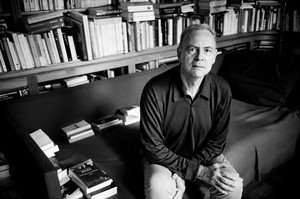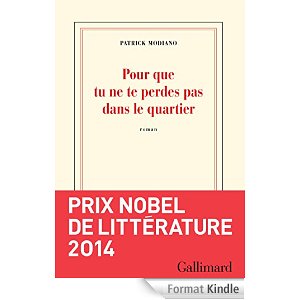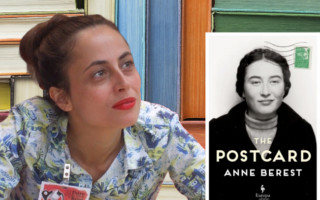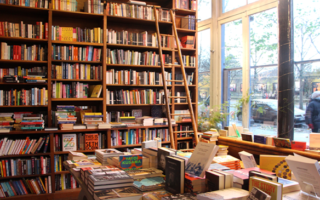French Novelist Patrick Modiano wins Nobel Prize for Literature
- SUBSCRIBE
- ALREADY SUBSCRIBED?
BECOME A BONJOUR PARIS MEMBER
Gain full access to our collection of over 5,000 articles and bring the City of Light into your life. Just 60 USD per year.
Find out why you should become a member here.
Sign in
Fill in your credentials below.
 In October, the names poured in from all over the globe. Malala Yousafzai, a Pakistani activist who champions girls’ rights to education, won the Nobel Peace Prize. Eric Betzig, a 54-year-old Virginian won the Nobel Prize for Chemistry. And France’s Patrick Modiano won the Nobel Prize for Literature. The man is prolific, having published 29 books throughout his career, as well as written children’s books and screenplays.
In October, the names poured in from all over the globe. Malala Yousafzai, a Pakistani activist who champions girls’ rights to education, won the Nobel Peace Prize. Eric Betzig, a 54-year-old Virginian won the Nobel Prize for Chemistry. And France’s Patrick Modiano won the Nobel Prize for Literature. The man is prolific, having published 29 books throughout his career, as well as written children’s books and screenplays.
His most recent work, Pour que tu ne te perdes pas dans le quartier, was published this year by Gallimard.
The author joins an impressive list of French Nobel winners, including Jean-Paul Sartre, Albert Camus, and Marie Currie (one of only four two-time winners). Established in 1895 by a Swede, Alfred Nobel, the Nobel Prize is regarded as the highest honor in the fields of Physics, Chemistry, Literature, Peace, Physiology or Medicine, and Economic Sciences. Its recipients are people who have advanced their fields and shown “outstanding contributions for mankind.” Previous Literature prize winners include Seamus Heaney, Toni Morrison, Ernest Hemingway, Winston Churchill, William Faulkner, and T.S. Eliot.
A kerfuffle erupted last week when France’s Culture Minister, Fleur Pellerin, was asked which Modiano book was her favorite. Pellerin said: “I admit without any problem that I have had no time to read over the past two years…I read a lot of news, but I read [for pleasure] very little.” There was a public outcry (well, “Twitter public”) and a call for her resignation from a highfalutin journalist.
The Nobel Academy says of him: “Modiano’s works centers on topics such as memory, oblivion, identity and guilt. The city of Paris is often present in the text and can almost be considered a creative participant in the works. Rather often his tales are built on an autobiographical foundation or on events that took place during the German Occupation…”
Modiano was born in Paris, just after the end of World War II. The city of Paris is central to much of his writing, as much as, say, New York City is central as a theme and character to Carrie Bradshaw’s narrative. Modiano’s first language was Flemish, as he was brought up by his maternal grandparents. His relationship with his father was strained, at best. In 1968, when Modiano’s first book, La Place de l’etoile, was published, his father detested it so much he tried to buy up all the copies so no one could read it.
“Many of his fictional works delve into the moral dilemmas that citizens faced during World War II, and some play with the detective genre,” read an article in the New York Times of Modiano’s work. Given the ever-tumultuous and depressing state of the world, and the subsequent pressing moral dilemmas (like those explored by Modiano), it’s easy to see why his words strike a chord with readers. It’s a calm in the storm.
 In my current city of London, the latest book buzz is about three books. There’s Revolution from the infamous comedian/raconteur/author/philanderer/ex-addict/rabble-rouser/vegetarian/Buddhist Russell Brand, in which he calls for a people’s revolution which includes not voting and not paying taxes. It has received scathing criticism. Columnist Craig Brown noted, “While he claims to be anti-Establishment, the book is published by Penguin Random House.”
In my current city of London, the latest book buzz is about three books. There’s Revolution from the infamous comedian/raconteur/author/philanderer/ex-addict/rabble-rouser/vegetarian/Buddhist Russell Brand, in which he calls for a people’s revolution which includes not voting and not paying taxes. It has received scathing criticism. Columnist Craig Brown noted, “While he claims to be anti-Establishment, the book is published by Penguin Random House.”
Then, The Guest Cat, a breezy read (at 140 pages) by Japanese poet and author Takashi Hiraide, about a young married couple in Tokyo who meet a “jewel of a cat,” which belongs to their neighbors, and makes a strong impression on the pair. The ending is beyond unexpected, and might make you say: “What the bloody WHAT?!” A bookseller at Daunt Books tells me it’s selling like hot cakes.
Another big seller is Stephen Fry’s latest autobiography (his third), More Fool Me. Fry joked on The Graham Norton Show that he’s got a lot of material. What do Fry, Brand, Hiraide and Modiano have in common? Not much. (Though a case could be made for Brand and Fry’s similar paths; comedy, fame, drugs, intellectualism.) All show us the power of a book, what it can bring, and how vital it is.
When he heard the news of his Nobel win, Modiano was walking down a street opposite Luxembourg Gardens. The news came from his daughter, via her cell phone. Of winning the Nobel Prize for Literature, Modiano said, “I’m very touched.”
But one has to imagine, when a person reaches that level of career success and global impact (at which you must arrive to be considered for a Nobel Prize), the accolades and awards are merely a nice by-product, not a pursued achievement. And that’s a pretty prime place to be.
That said, I’m sure the hefty prize money doesn’t stink.
More in French novelist, French writer, Nobel prize, Patrick Modiano




